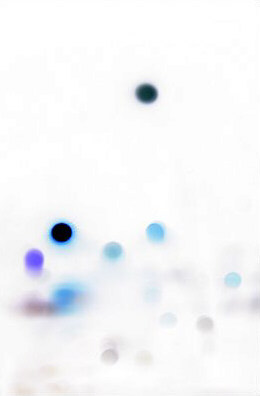 March 06
March 06
Flakes
by Jay Michaelson
p. 3 of 3

4. In Search of Integral Kabbalah
The religion of flakiness has also found a vocabulary in contemplative Judaism, chiefly that of Kabbalah. Here, the distortions are different from those of Buddhism, but instructive nonetheless. Kabbalah, in its essence, teaches about depth and balance. Depth in that there are many layers of reality, of which the visible one is only the most superficial. Balance in that both the horizontal and the vertical forces of the universe are constantly shifting, and are in constant need of maintainance and correction.
In the traditional vocabulary, depth is expressed in terms of the four layers of interpretation of scripture, the four worlds, the four souls, the vertical direction of the sefirot, and so on; it's how the One relates to the Many. Balance is expressed in terms of the horizontal array of the sefirot, maintaining the Divine flow primarily by means of observing the commandments, masculine and feminine as well as the later Lurianic themes of breakage and repair and Hasidic ones of ratzo v'shuv (oscillating between Divine and ordinary consciousness). Of course, there are countless other themes in the Kabbalistic literature, but this will do for a start. And in the Kabbalah of flakes, both depth and balance are utilized in the service of negating the importance of "square" values.
Depth is perhaps the most obvious. If what's happening on the material, observable plane is only the superficial skin of reality, why worry about it? It is significant only insofar as it reveals the much deeper, more profound shifts of the cosmic life within. Yes, it is important that an appointment be kept, but not (heaven forbid) because you are losing yourself in the world of materiality, but only because it has some higher purpose. If you give up on an individual project, it is meant to be. If you leave town in the middle of working on a group project, it is meant to be. The Kabbalah's matrix of hermeneutical tools can easily be marshaled to explain why any development is "meant to be" -- and this is what many Kabbalists themselves do, even regarding the most tragic of human catastrophes. Too much concern with gashmiut is a symptom of delusion, because it suggests that one thinks the material world is what really matters, on its own terms. And curlicues of "interpretation" are delights in the orchard of pomegranates.
The relationship of flakiness to balance is ironic, because here, the Kabbalah itself offers a way out of the green-meme cul de sac. The overwhelming majority of Jewish spiritual flakes, at least that I have encountered, are Hasidim -- more specifically, neo-Hasidim, or those who combine Hasidic teachings with contemporary mores and ethics. Hasidism comes from the word hesed, which is the aspect of the Divine manifesting as lovingkindness, grace, suppleness, and extension of the self. (Interestingly, though in our contemporary culture, these values are usually gendered as feminine, in the Kabbalah, they are seen as masculine.) More love, more relaxation, more sensitivity; more openness, more extension. Now, in classical Kabbalah, hesed is balanced by gevurah, which expresses constriction, judgment, boundary, forcefulness. And in classical Hasidism, the hesed is yoked together with scrupulous observance of the law. But in flaky neo-Hasidism, hesed runs amok.

It is true that, according to almost every Kabbalistic teaching, what the world needs now is not more gevurah -- more power and judgment -- but more love. The Kabbalists devote much of their energy to the "sweetening" (really, in the original Aramaic, "perfuming") of judgments, to avert harsh decrees and arouse Divine compassion. The impetus for doing so was less the desire for the Age of Aquarius, though, than for an end to the merciless persecutions and pogroms which tormented the Jewish people for centuries. Kabbalah was a literature of exile, and of course, they prayed for the exile to end, and for the harshness of Divine judgment to be averted.
Today, however, one might wonder whether the same imbalances are present in the lives of non-working Hasidim of haredi Israel, or the hippie-Hasidim of the American (and American-Israeli) community. As with the Buddhist world, the problem is not among dedicated practitioners who devote their lives to tikkun olam, to perfecting their spiritual traits, and toward a life of devekut. The problem is with the hobbyists. Exactly as in the Buddhist world, when the Kabbalistic-Hasidic worldview is simply injected into a pre-existing, self-oriented Western consciousness, the result is less transformation than tripping out. Spiritual practice becomes about "getting high." Cosmological language is used not to question preferences, but to deify them (now that which one does not like is the klipa, the evil shells to be discarded). And hesed without gevurah leads to boundarilessness, flakiness, and, again, endless processing.
The irony, of course, is that Kabbalistic practice is about balance, not enhancing one aspect of creation at the expense of another. To be sure, the world may well need more hesed right now -- more on that in the next, final section -- but not necessarily in all cases. In a green-meme world dominated by spiritual materialism, narcissism, and "getting high," perhaps what's needed is not more hesed, but more gevurah.

5. But Maybe the Flakes are Right
Thus far, I've been pretty hard on the flakes. By way of conclusion, though, I want to entertain several reasons why they may be right -- and admit that I really don't know.
First, and perhaps most obviously, the culture of the flakes is a subculture, which cannot be understood except in relation to its dominant culture. Sure, within their own enclaves, the flakes are irritatingly soft and narcissistic -- but those are enclaves within a wider society that is over-hyped, over-tight, and over-mechanized to the point of collective mass insanity. Maybe the flakes are too sensitive, green-memey, and unreliable, but they're merely a counterpoint to a conservative, blue-meme world -- a useful corrective to an overly uptight dominant culture.
Second, maybe the flakes are really right on the merits. If one were to translate the dharma into contemporary life (i.e., my life), one might say: Stress happens because of too much desire. If I didn't have so much desire, I'd do less, rush less, and enjoy more. On a small scale, I wouldn't be in such a hurry to pack as much into each day. On a larger scale, I wouldn't feel I have to achieve so much in one life. But both the simple desires, and the more complex ones, push me to push myself. Flakes, in contrast, are relaxed. Sure, things don't happen as they plan -- but if you worry too much about planning, you're going to suffer. Stop being so ambitious -- what's the point? Who's happier -- the busy Germans, or the lazy Greeks? The achieving Bostoners, or the laid back boys from Georgia? Maybe the day-job, and the day-planner, are keeping me from my full spiritual potential.

Third, not only is flaking better for the soul, it might be better for the world too. Ask yourself, which would bring more peace to the world -- a million squares or a million flakes? Sure, the squares would make the trains run on time; so did Mussolini. With flakes, the plumbing might always be broken, but there probably wouldn't as much war. I know, conceivably there'd probably be a lot more disease, and all the other bad things that left-brain, blue- and orange- meme technology has banished from our lives. And if one culture flaked, probably another, less-flaky culture (like the Chinese) would gladly take over the reins of world capitalism, eventually leading to the demise even of flakes themselves. But if we could all universally miss a few appointments and not worry about it, I wonder if the world wouldn't be a happier place for awhile.
Part of the problem is that flakes don't leave a record of themselves; they rarely bother enough to finish works of great literature, and they don't do a whole lot. Thus, looking back at the sweep of history, it's hard to find records of great flakes. Like Shakespeare's sister, whose genius was never known, the great flake heritage has gone unwritten for centuries, maybe millennia. History is written by the victors, and the essence of neo-Taoist, narcissist-Buddhist, neo-Hasidic flakiness is that you don't care about winning. Only the rarest of books -- the Tao Te Ching, Ecclesiastes -- survive to carry the banner of flakiness, or at least rest it somewhere against a wall.
At the end of the day, there is always an extent to which flakiness will always be less about ideology than temperament and upbringing. Some people have to train themselves to work hard; I've had to train myself to relax. But as a personal matter, I feel as though a lot of it is a choice -- or rather, a hundred small choices, made each day as I try to balance enjoying life and making something out of it, being and doing. I've met so many interesting teachers and followers of contemplative paths over the last several years, with many different models for how to achieve that balance. Some have secretaries and Blackberries; others literally won't use a computer. To the extent it's a matter of taste, I don't know which taste I prefer. To the extent it's a matter of skillful living, I don't know which side is right.
These questions matter to me because I notice that I'm happiest when I care the least about the trappings of the outside world. When I'm working hard to fund this magazine, or get my work published, or advance my career in this or that way, I find that I quickly become trapped in envy and regret. Why didn't I become a professor, like my richer and more respected friends? Why didn't I stay with politics, and fight for what I believe? Why is that other, worse magazine getting so much more money than this one? On the other hand, I often ask myself the opposite questions. Why do I keep trying so hard? Why don't I feel I've accomplished anything? Why can't I be happy with the love and success that I have -- let alone the beauty of a spring day in Jerusalem?
The question of the flake is a real one because it speaks to the pursuit of happiness. I think what I'm yearning for is the ability to work with the resiliency of gevurah and netzach, but with the ego still relaxing in hesed. I'd like to be reliable and committed, but with the open heart of the flake. I'd like to run spiritual retreats in which souls soar, but have them start and end on time, with appropriate funding and support. Spirituality and a spreadsheet, as I said to one colleague recently. As always, I'd like to have my cake and eat it too.

Perhaps the resolution of the problem of flakes comes in noticing the problem of the self, which exists almost entirely congruent with it, but on another plane of psychological reality. Both hesed and gevurah work well enough when the self is not involved. It's when the ego gets invested that things become a problem. That's when hesed turns into the oxymoron of Buddhist narcissism, or when gevurah turns into games of power and violence, including against the self. When the ego is lessened, then commitment isn't about disciplining the self and adhering to some kind of code -- it's about remembering the Other.
That's it, isn't it? That even the Bodhisattva turns back -- even the one completely enlightened looks back at the rest of us and has compassion. Kal v'chomer someone who's not got as pressing an agenda as realization. But I don't want to hide my uncertainty behind the ethics of Levinas. I think the flakes are narcissistic, but it's not like I know any better. Responsibility feels like an anchor, keeping me moored in the realm of the real. But who knows -- if the anchor were cut, who knows in what seas I might sail?










